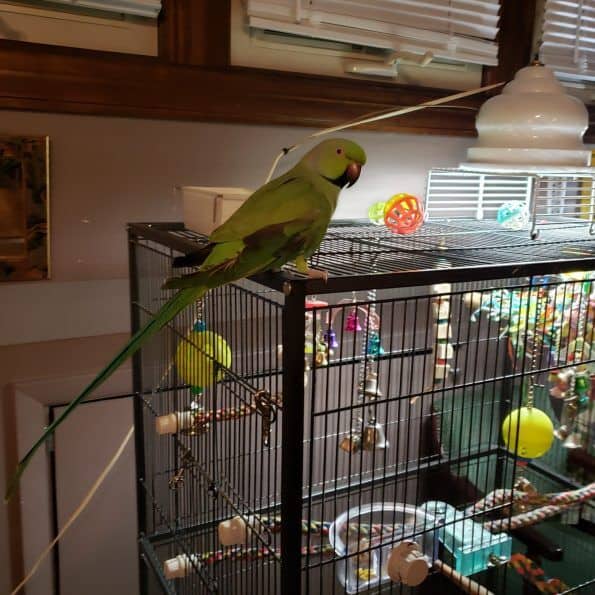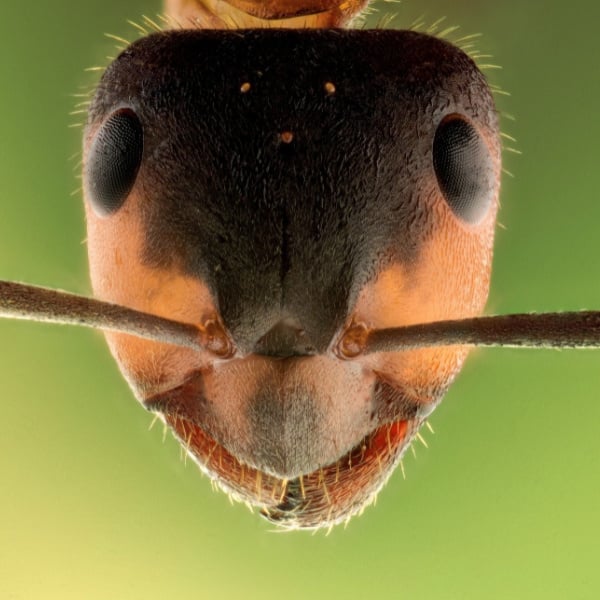Last Updated on by Mitch Rezman
I wear many hats at Windy City Parrot.
About 30% of my week I wear my CMO hat which means Chief Marketing Officer.
In keeping well-versed in marketing I read a huge amount of content.
One recurring theme I see is this is the way I should be marketing to millennial’s.
The perfect way to market to millennial’s is……..
My problem with that is there are 74 million or so millennials in the US.
So these experts are going to tell me that there is one specific way that I will be successful in getting the message across to 74 million people of both sexes.
So for someone to answer the question “what are some of the tips for keeping a parrot” they are on a fool’s mission.
There are roughly 600 or 700 species of parrots and if we include parakeets starting with budgies (budgerigars) that weigh about 25 g (or the size of two Reese’s pieces).
We have to include Hyacinth macaws in this list that way up to 2500 g (5 pounds or 100 Reeses pieces), and can be almost 4 feet long.
Conures can be very vocal and loud. Poicephalus (Senegals, Meyers Red-bellies) – not so much.
Birds do require toys but for more reasons than to keep them occupied.
Bird toys enable them to act out their instinctual expectations of foraging.
Most toys should be hung in the top one-third of the bird cage forming a canopy that a bird can feel safe behind. You can make your own or you can even find things that are already made for you like phone books and wooden cooking spoons at the dollar store.
And yes birds can hide illness very well but with a simple tool like a scale where you weigh your bird every week or two, you’ll find that sudden swings of weight can indicate a possible health problem.
A blood workup once a year is good for a bird, a dog or cat to know where they stand nutritionally.
This can head off the trip to the vet or make a trip to the vet less expensive. Any pet that you have is going to require a vet visit at least annually.
You’re not required to get licensed by the city for the county for birds so you’ll be saving that money over dog or cat.
Birdcage size depends upon the lifestyle of the bird and the captive bird owner. If the bird is out of the cage for six straight hours a day doesn’t need such a large cage.
Large cages are nice to allow the flight of a given size bird but not necessary if you teach your bird how to fly properly they can use your home as a great place to exercise.
Cheap seed mixes will not cause fatty liver disease there’s been no correlation between the two.
Fatty liver disease is caused by too much fat and not enough exercise.
If your birds like seeds that’s fine. Many seed blends have pellets mixed into the seed bag.
Supplements can be added to a pet bird’s diet to give them a rounded nutritional offering.
Depending upon the size of the bird seeds and nuts are fine peanuts. Peanuts do not give birds aspergillosis – peanuts that have mold do.
The largest producer of peanuts is South America. The largest population of parrots in the world is in South America. Because we don’t hear parrots falling out of the sky over Bolivia on a regular basis we know that peanuts are not hurting our birds.
If you want to serve peanuts to a bird make sure it comes in a sealed bag from a reputable manufacturer
When the best place for information is the blog on our website where I have personally written more than 1000 articles on bird care based upon my observations, conversations, and interactions between tens of thousands of birds and their keepers.
In general, I found the Facebook groups to offer more anecdotal information much of it wrong.
Just because you have been driving for many years doesn’t mean you know how to perform a brake job in a car. The same holds true for birds.
Just because you have had birds for many years does not make you an expert.
People say that birds have the intelligence of a three-year-old which they do but it goes beyond that.
They have three times the neurons per square centimeter of brain mass in a mammal so they’re not only thinking at a high level, they think at a high rate of speed. This is necessary when you fly at 30 miles an hour trying to not fly into walls in the home in trees in the forest.
An unsocialized bird is a pair of scissors with wings. It is easy to keep them from destroying human possession by offering them bird possessions like numerous play stands in the house.
When a bird is out of its cage it needs to know where to go not just any piece of furniture and needs to have its own area in every part of the home it resides with you.
If your bird bites you it’s your own damn fault. Biting is not acceptable from a bird any more than a dog or a cat.
As early as a few months old it’s important to begin clicker training with the bird in order to reinforce positive behavior.
We’ve had our rescue Senegal for more than a year now and I’ve only been bitten once in the past six months and that was because I’d been gone all day and Peaches didn’t want to go in her cage.
I knew she was agitated and I should grab her around the neck so she couldn’t bite me.
I felt bad because of our lengthy separation so I just gently grabbed her while doing so I got bit hard.
I then grabbed her around the neck the way a veterinarian would do to avoid future bites until I returned her to her cage
Bonding with a singular human can be a problem. To make things more complicated certain species like African grays will bond with a certain individual in the household at a young age (12 to 18 months) but at five or six years old may decide to bond with somebody else in the family.
This is done to prevent inbreeding in the wild so that the birds can mate with birds, not in the same family. Something that many people do not understand and mistake for negative hormonal behavior.
The majority of caged bird keepers miss the point of how important lighting is to a bird. I’m not talking UVA or UVB because I am convinced that it does not help with synthesizing vitamin D.
Most parrots come within a narrow range of 40° latitude above or below the equator. This means their instinctual expectations of lighting is 12 hours of light and 12 hours of darkness.
We bring them into our homes in North America with counter instinctual lighting expectations and put them by big picture windows which get them scared of hawks and feral cats passing by out-of-doors because they do not understand “glass”.
One of the first things we recommend is the installation of a full-spectrum light no more than 6 inches over the top of a birdcage connected to a timer so that the bird can understand when the day ends and the day begins.
This will have an impact on its daily circadian clock (rhythm) which tells the time of day and his annual circadian clock or rhythm which tells them when to mate, molt and for many species of birds when to migrate.
If you’ve not had a bird before, consider a small one like a budgie or cockatiel. Easy to maintain, easy to train and fun to have.
Male cockatiels and budgies are great talkers and do not require super large cages.
The first rule to follow:
Bigger bird, bigger brain, bigger poop and bigger beak (bite).
Written by Mitch Rezman
Approved by Catherine Tobsing
Author Profile
Latest entries
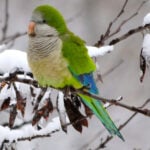 The Traveling BirdJune 26, 2025Can You Name 5 Parrot Species That Are Living Wild in the USA?
The Traveling BirdJune 26, 2025Can You Name 5 Parrot Species That Are Living Wild in the USA?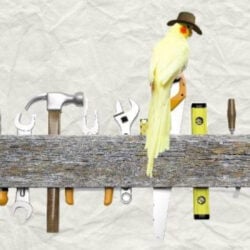 Bird BehaviorJune 26, 2025How is it Parrots Are Problem Solvers Social Animals and Even Use Tools?
Bird BehaviorJune 26, 2025How is it Parrots Are Problem Solvers Social Animals and Even Use Tools?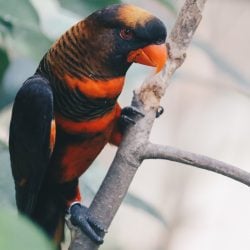 Bird & Parrot AnatomyJune 25, 2025How a Tiny Chemical Modification Makes Parrots Nature’s Living Paintings
Bird & Parrot AnatomyJune 25, 2025How a Tiny Chemical Modification Makes Parrots Nature’s Living Paintings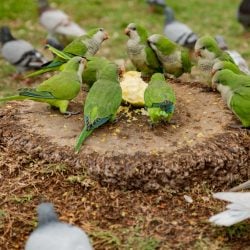 PigeonsJune 20, 2025How Do Parrots Thrive in Cities Outside Their Native Habitats?
PigeonsJune 20, 2025How Do Parrots Thrive in Cities Outside Their Native Habitats?

